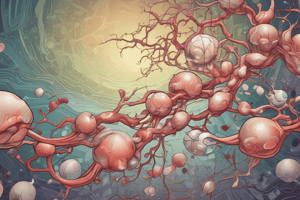Podcast
Questions and Answers
What is a pituitary adenoma?
What is a pituitary adenoma?
A benign tumor that develops in the pituitary gland.
SIADH is characterized by excessive production of antidiuretic hormone causing water retention and __________.
SIADH is characterized by excessive production of antidiuretic hormone causing water retention and __________.
hyponatremia
What are symptoms of pituitary adenoma?
What are symptoms of pituitary adenoma?
- Hormonal imbalance
- Vision problems
- Headaches
- All of the above (correct)
Acromegaly occurs in children and adolescents.
Acromegaly occurs in children and adolescents.
Match the condition with its description:
Match the condition with its description:
Study Notes
Pituitary Adenoma
- A benign tumor that develops in the pituitary gland
- Most common type of pituitary tumor
- Can be classified into three types:
- Microadenoma: small, non-invasive tumor (<1 cm in diameter)
- Macroadenoma: large, invasive tumor (>1 cm in diameter)
- Invasive adenoma: tumor that invades surrounding structures
- Symptoms depend on the type of hormone affected and the size of the tumor
- Can cause:
- Hormonal imbalance
- Vision problems
- Headaches
- Seizures
Acromegaly vs Gigantism
- Both conditions are caused by excess growth hormone (GH) production
- Acromegaly:
- Occurs in adults
- GH production increases after normal growth has stopped
- Causes:
- Enlargement of hands and feet
- Coarse facial features
- Joint pain
- Sleep apnea
- Can lead to cardiovascular disease, type 2 diabetes, and arthritis
- Gigantism:
- Occurs in children and adolescents
- GH production increases during normal growth period
- Causes:
- Excessive growth rate
- Tall stature
- Enlarged hands and feet
- Can lead to social and emotional problems
Familial Pituitary Tumor Syndrome
- A rare genetic disorder characterized by the development of pituitary tumors in multiple family members
- Caused by mutations in the AIP gene
- Associated with:
- Pituitary adenomas
- Acromegaly
- Gigantism
- Cushing's syndrome
- Hyperparathyroidism
- Can also increase the risk of other endocrine tumors
SIADH (Syndrome of Inappropriate Antidiuretic Hormone)
- A condition characterized by excessive antidiuretic hormone (ADH) production
- Causes:
- Water retention
- Hyponatremia (low sodium levels)
- Fluid overload
- Symptoms:
- Headache
- Nausea and vomiting
- Seizures
- Confusion
- Can be caused by:
- Brain injury or tumor
- Infections
- Certain medications
- Cancer
Diabetes Insipidus
- A condition characterized by the inability to regulate water balance
- Caused by:
- Deficiency of antidiuretic hormone (ADH)
- Insensitivity to ADH
- Symptoms:
- Excessive thirst
- Frequent urination
- Pale, diluted urine
- Dehydration
- Can be caused by:
- Head trauma
- Brain tumor
- Infections
- Genetic disorders
- Medications
Pituitary Adenoma
- Benign tumor that develops in the pituitary gland
- Most common type of pituitary tumor
- Classified into three types: microadenoma, invasive adenoma, and others
- Symptoms depend on the type of hormone affected and the size of the tumor
- Can cause hormonal imbalance, vision problems, headaches, and seizures
Acromegaly and Gigantism
- Both caused by excess growth hormone (GH) production
- Acromegaly:
- Occurs in adults
- Causes enlargement of hands and feet, coarse facial features, joint pain, and sleep apnea
- Can lead to cardiovascular disease, type 2 diabetes, and arthritis
- Gigantism:
- Occurs in children and adolescents
- Causes excessive growth rate, tall stature, enlarged hands and feet, and social and emotional problems
Familial Pituitary Tumor Syndrome
- Rare genetic disorder characterized by the development of pituitary tumors in multiple family members
- Caused by mutations in the AIP gene
- Associated with pituitary adenomas, acromegaly, gigantism, Cushing's syndrome, and hyperparathyroidism
- Increases the risk of other endocrine tumors
SIADH (Syndrome of Inappropriate Antidiuretic Hormone)
- Characterized by excessive antidiuretic hormone (ADH) production
- Causes water retention, hyponatremia, and fluid overload
- Symptoms include headache, nausea and vomiting, seizures, and confusion
- Can be caused by brain injury or tumor, infections, certain medications, and cancer
Diabetes Insipidus
- Characterized by the inability to regulate water balance
- Caused by deficiency of antidiuretic hormone (ADH) or insensitivity to ADH
- Symptoms include excessive thirst, frequent urination, pale and diluted urine, and dehydration
- Can be caused by head trauma, brain tumor, infections, genetic disorders, and medications
Studying That Suits You
Use AI to generate personalized quizzes and flashcards to suit your learning preferences.
Description
Learn about pituitary adenoma, a benign tumor that develops in the pituitary gland, its classification, and symptoms. Test your knowledge on the types of pituitary adenoma and their effects on the body.



